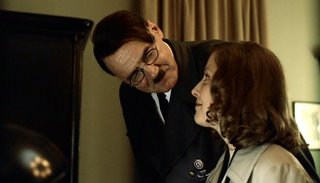
I'd been impressed with Hirschbiegel's epic on Hitler's bunker last year; this time it was a revelation. A major film, without question. Controversy was inevitable, perhaps because Bruno Ganz's performance as the Austrian is so mesmerising, and so human, that it lends ammunition to those of a Lanzmann-esque stamp who argue that humanising Hitler, or the architects of the Holocaust, in any way, is to diminish its incalculable cruelty, and their crimes. I have never entirely subscribed to this view; in Ron Rosenbaum's masterpiece of a book Explaining Hitler Lanzmann is categorically opposed to rationalising the Holocaust; considers the publication of pictures of Hitler as an infant a slight on the six million. Hirschbiegel seems intent on presenting a much more unsettling view of the Great Tyranny, insofar that it was not the visitation of the divine or the machine; the whole hideousness was wrought by human agency. Indeed, Lanzmann's Shoah, fine work as it is, has been described by some as relentless, mechanistic, as much so as the kit of annihilation it describes. Of course the Holocaust mass-produced death, as Lanzmann would no doubt, and with some justification, say in defending his method of factory-farming one unconscionable atrocity memoir after another; but the creators of its instruments suffered from diarrhoea and ejaculatio praecox like other human beings who didn't happen to slaughter millions of innocent people.
Hirschbiegel's movie maybe only avoids greatness by its seemingly lenient treatment of Speer, who is portrayed throughout as a shuffling sceptic, fully aware of the impending doom. Alexandra Maria Lara is distractingly beautiful as the author of the diaries that inspired the film, Hitler's PA, Traudl Junge - with a bit too much of the doe-eyed ingenue about her insidiously ventriloquizing the questionable defence of naivety and innocence of evil. Julia Kothner is electrifying as the permanently moonstruck party girl Eva Braun, although her performance owes a lot to the unforgettable Party groupie Luzi in Edgar Reitz's first Heimat movie, astonishingly brought to life by newcomer Karin Rasenack. Goering's notable for his absence, Keitel and Jodl also. Himmler is strangely peripheral also; the bug-eyed ranting fanaticism is left to the improbably charmless Goebbels and wife (Ulrich Matthes and Corinna Harfouch). The latter's crazed, keening supplication to the Fuhrer not to desert the cause is almost as chilling as the way she dispatches her children, for what sort of a world would it be without National Socialism?
There can't be many harder roles than Goebbels, to render such a despicable vermin as even remotely human. I've read several critics who maintain he was the intellectual of Hitlerism; this is arguable, but the fact that he was one of them makes the whole of 1933-1945 even more macabrely surreal. Failed novelist (his Michael makes Alexander Cordell read like Homer), philistine, arch-racist, petit-bourgeois snob, more airs than anyone could count - and fucking spaz, as no doubt he would put it if referring to anyone else - he was maybe the most unaccountably successful serial fucker in history. Magda bore it all - largely, one suspects, due to a devotion to National Socialism that renders the word 'fundamentalist' redundant.
The veracity of Junge's account has been questioned. But it's Hirschbiegel's gift to make us believe that this is just what we want to believe, but also the opposite. The casual brutality and excruciating loudness of his battle scenes - including, crucially, the Hollywood no-no of having shells explode with a deafening CRACK and not a billow of flames - suggest that authenticity is high on his list of priorities.
No comments:
Post a Comment